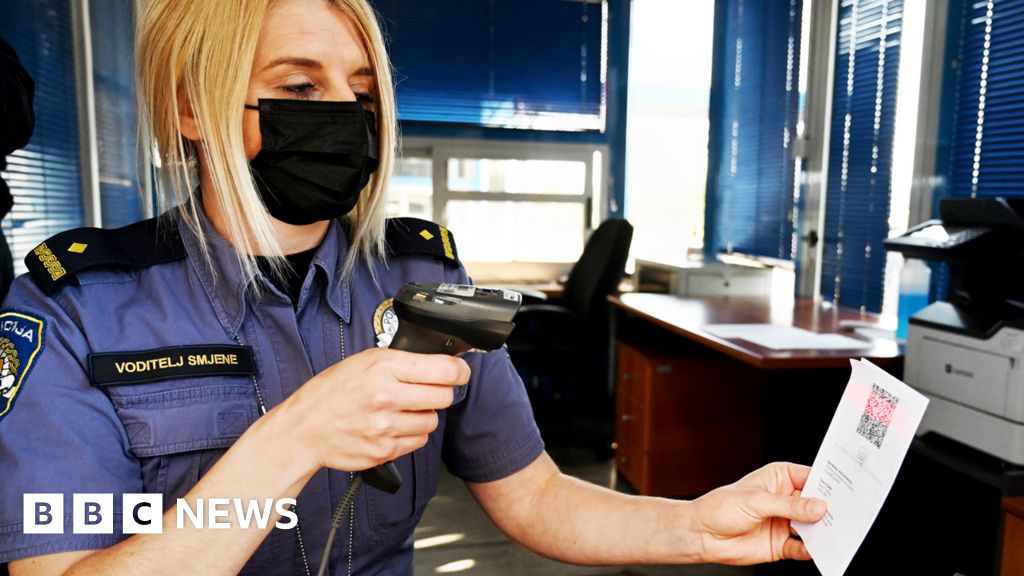[ad_1]
The EU’s vaccine passport – the Digital Covid Certificate – is being rolled out across all 27 member nations.
Who can use it and what does it mean for UK travellers heading to Europe?
What is the Digital Covid Certificate?
- been vaccinated against Covid-19
- recently had a negative PCR test for the virus
- recently recovered from Covid-19
It’s available in, and recognised by, all 27 EU member states – plus Switzerland, Iceland, Norway and Liechtenstein.
It’s free – and all EU citizens, as well as non-EU nationals legally staying or living in the member states (with the right to travel to other member states) can download it or obtain a paper copy.
Some countries have already been using the certificate on a voluntary basis – but it’s being officially introduced from 1 July with a six-week phase-in period.
The individual’s data remains on the certificate and is not stored or retained when it’s verified – at an airport, for example.
Why is it needed?
It’s hoped the certificate will make it easier for people to travel around the EU.
It is not a travel document – they will still need to carry a passport or another form of identification.
But anyone holding a certificate should, in principle, be exempted from testing or quarantine when crossing an international border.
Is it the same as the UK’s NHS Covid Pass?
It’s not the same – but both show the same information and aim to make it simple for someone to show their Covid status.
The digital NHS Covid Pass can be accessed via the existing NHS app. A paper version can be requested by calling 119.
For people aged 16 and over in England, it shows proof of:
- vaccination
- a negative PCR test
- recovery from Covid-19
Will the EU recognise the NHS Covid Pass?
Not yet – but some individual countries, such as Greece and Spain, are already accepting it.
If it’s satisfied a non-EU certificate complies with EU “standards and systems”, it can decide to accept it across all 27 nations.
The UK government says free and open travel is a priority.
“We are engaging the European Commission on reopening travel routes from the UK,” an official said.
If you are an EU national who was vaccinated in the UK, it is up to your home country whether you are eligible for the EU certificate.
Will it matter which vaccine someone receives?
- the Pfizer-BioNTech vaccine is sometimes known as Comirnaty
- Oxford-AstraZeneca (AZ) is known as Vaxzevria
- Moderna is known as Spikevax
- Janssen (sometimes referred to as the Johnson & Johnson vaccine) is the same as in the UK
But AZ vaccine doses manufactured by the Serum Institute in India (SII) are also known by a third name – Covishield.
And while they are identical to those made in Europe, the EU has not authorised them for use.
Does it matter Covishield is not EU-approved?
Covishield is widely used in poorer countries, via the Covax vaccine programme, and there’s concern the EU passport will discriminate against travellers from those nations.
The European Medicines Agency (EMA) doesn’t need to approve AZ’s manufacturing site in India, because the EU isn’t receiving any doses from there.
But the Serum Institute is understood to be seeking emergency EU authorisation for Covishield.
AstraZeneca also says it’s working with the EMA on the “inclusion of Covishield as a recognised vaccine for immunisation passports”.
Could I have received a Covishield dose in the UK?
If you were told you were having an AZ vaccine, it’s possible.
Most of the UK’s AZ doses are supplied from plants in north Wales and Staffordshire.
But five million Covishield-branded doses were shipped from India as part of the UK’s 100-million-dose AZ order.
The Department of Health won’t comment on individual vaccine supplies, because of commercial and security considerations.
Will it matter if I want to go to the EU?
If you received an AZ vaccination – and go to an EU country that accepts the NHS Covid Pass – your pass should show you received the Vaxzevria vaccine, the EU name for the AstraZeneca jab.
“All AstraZeneca vaccines given in the UK are the same product and appear on the NHS Covid Pass as Vaxzevria,” the Department for Health says.
[ad_2]





